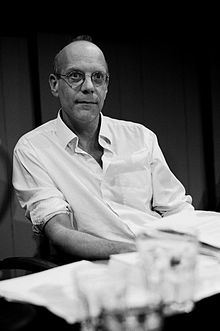- Geert Lovink
-
Geert Lovink (* 1959 in Amsterdam) ist ein niederländisch-australischer Medienwissenschaftler und Netzaktivist.
Inhaltsverzeichnis
Leben
Lovink studierte zunächst Politikwissenschaft an der Universität von Amsterdam, bevor er an der Universität Melbourne mit einer Arbeit über die „Dynamik der kritischen Internet-Kultur“ (Dynamics of critical internet culture) promoviert wurde. Im Jahre 2003 war er Postdoc-Fellow an der Universität Queensland in Brisbane. 2004 erhielt er einen Ruf als Forschungsprofessor an die Hogeschool van Amsterdam (HvA), wo er interaktive Medien unterrichtet, seit 2006 lehrt er als Professor an der European Graduate School in Saas-Fee.[1] Daneben ist er Dozent für Neue Medien an der Universität von Amsterdam.[2]
Lovink ist Gründungsdirektor des medientheoretischen Institute of network cultures (INC) mit Sitz an der Hogeschool van Amsterdam[3], das sich der Kultur in virtuellen Netzwerken als soziales Phänomen widmet und diese „von innen heraus“, also als teilnehmender Beobachter, untersucht.[4] Das 2004 gegründete Institut beschäftigt sich mit dem Internet und sämtlichen anderen neuen Medien.
Außerdem hat Lovink eine Reihe weiterer Projekte zur Netzkultur initiiert, die er bis heute begleitet, darunter das Magazin zur Medienkunst Mediamatic[5] und die Kampagne für unabhängige Medien in Südosteuropa Press Now[6], die im Zuge des Zerfalls von Jugoslawien entstanden war. FibreCulture ist ein australisches Forum zur Internetkultur, das Lovink 2001 mitgegründet hatte.[7] Seit 1995 betreibt er die Mailingliste nettime-l, die als ein Medium für den medientheoretischen Diskurs dient.[8]
Am 31. Mai 2010 nahm Geert Lovink an der Aktion „Quit Facebook Day“ teil und löschte seinen Facebook-Account.[9]
Veröffentlichungen
- Lovink, Geert. Dark Fiber, Cambridge Mass.: MIT Press, 2002 (dt.: Dark Fiber - auf den Spuren einer kritischen Internetkultur, Bonn: Bundeszentrale für politische Bildung, Schriftenreihe, Band 425, 2003; zugleich: Opladen: Leske und Budrich, 2004 ISBN 3-81004145-9).
- Lovink, Geert. Uncanny Networks, Cambridge Mass.: MIT Press, 2002.
- Lovink, Geert. My First Recession, Rotterdam: NAi/V2_Publishing, 2003.
- Lovink, Geert. The Principle of Notworking, Amsterdam: Amsterdam University Press, 2005.
- Lovink, Geert. New Media, Art and Science: Explorations Beyond the Official Discourse, in: Scott McQuire and Nikos Papastergiadis (eds.), Empires, Ruins + Networks: The Transcultural Agenda in Art, Melbourne: University of Melbourne Press, 2005.
- Lovink, Geert. Tactical Media, the Second Decade, Brazilian Submidialogia, 2005.
- Lovink, Geert and Rossiter, Ned. Dawn of the Organized Networks, in: Fibreculture Journal 5 2005.
- Lovink, Geert. Zero Comments: Blogging and Critical Internet Culture, London and New York: Routledge, 2007
- deutsch: Zero Comments: Elemente einer kritischen Internetkultur, Transcipt Verlag, Bielefeld 2008 ISBN 978-3-89942-804-9
Siehe auch
Weblinks
 Commons: Geert Lovink – Sammlung von Bildern, Videos und Audiodateien
Commons: Geert Lovink – Sammlung von Bildern, Videos und Audiodateien- Literatur von und über Geert Lovink im Katalog der Deutschen Nationalbibliothek
- Geert Lovink @ European Graduate School mit Biographie und Bibliographie (Englisch)
- Website des Institute of network cultures
- dort die Wikipedia research initiative Wikipedia critical point of view
- Mailingliste nettime-l
Einzelnachweise
- ↑ Geert Lovink als Mitglied des Lehrkörpers der European Graduate School mit Biographie und Bibliographie (Englisch)
- ↑ Geert Lovink: Kurzbiographie (shorter biography), Geert Lovinks Biographie beim Institute of network cultures.
- ↑ Institute of network cultures: Website.
- ↑ Institute of network cultures: About the institute.
- ↑ Homepage von Mediamatic.
- ↑ Homepage von Press Now
- ↑ Homepage von FibreCulture.
- ↑ nettime mailing list: info.
- ↑ Join the Facebook Exodus on May 31!, Blogbeitrag, 27. Mai 2010.
Kategorien:- Medienwissenschaft
- Netzkultur
- Hochschullehrer (Saas-Fee)
- Hochschullehrer (Amsterdam)
- Niederländer
- Geboren 1959
- Mann
Wikimedia Foundation.

